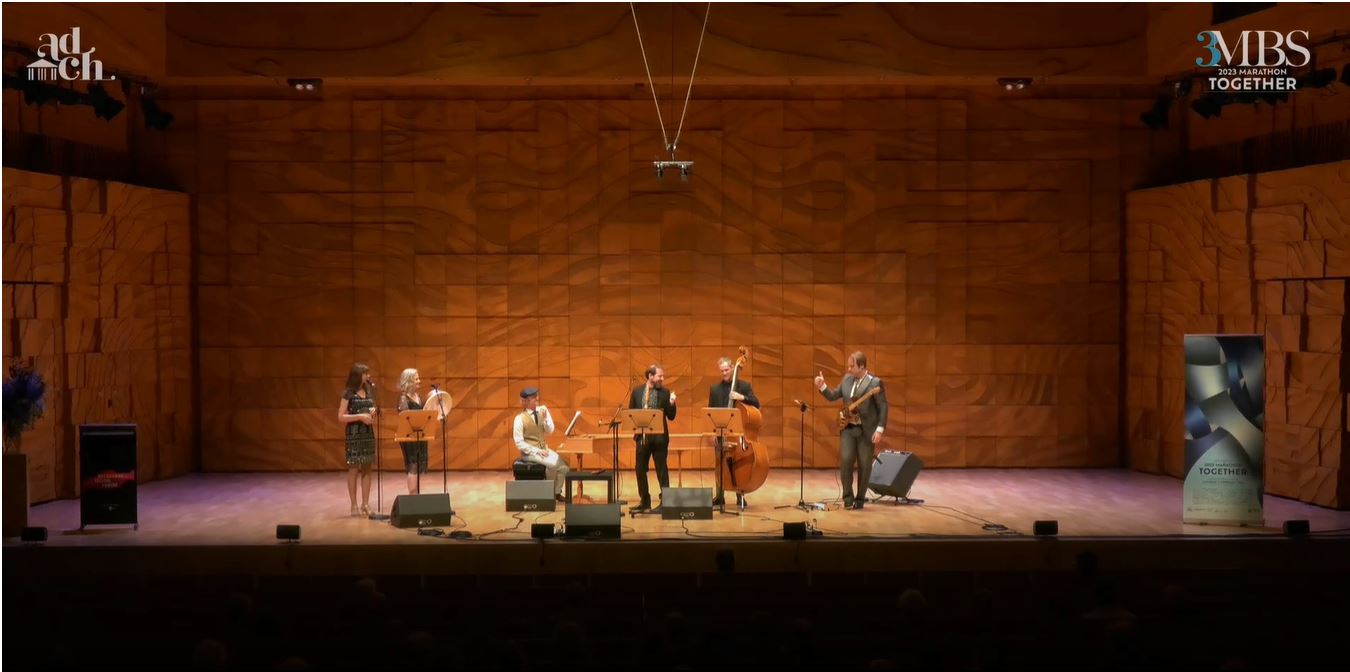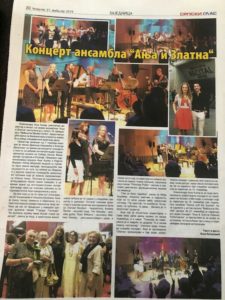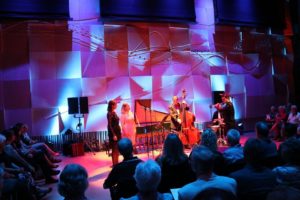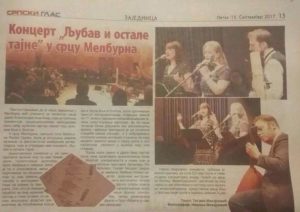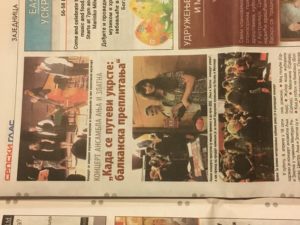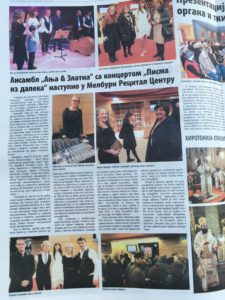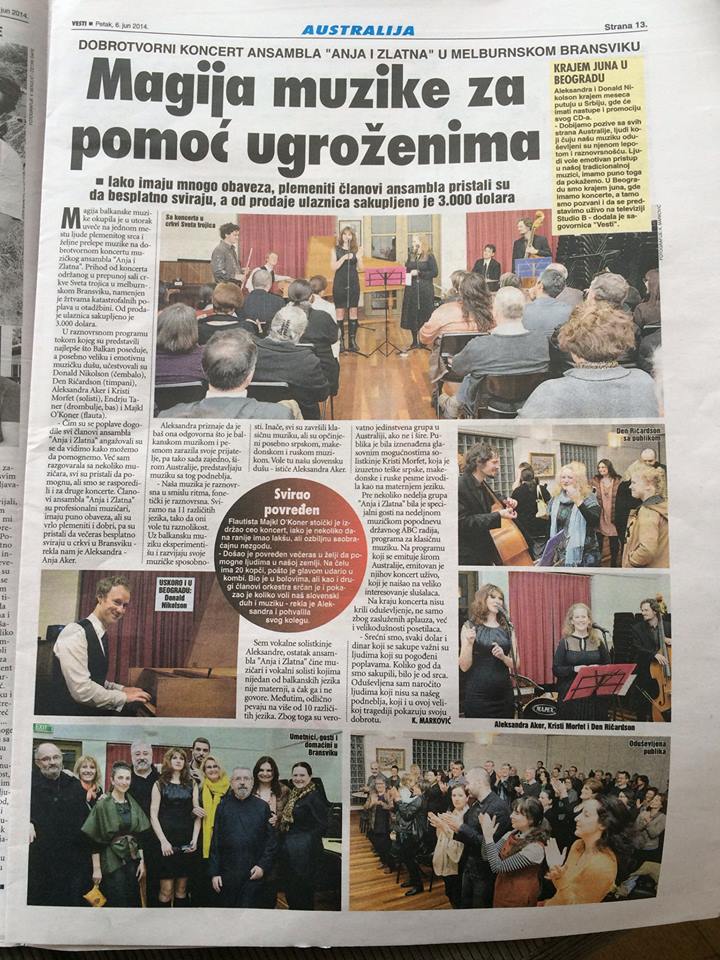A review of “Burnt by the Sun”
A review of “Songs of Farewell”
http://srpskiglas.com.au/koncert-anje-i-zlatne-pod-nazivom-songs-of-farewell/?fbclid=IwAR1WcV906-tAeO2RGjpFf_GO4abmPVNXcjtH9oIwCCkxk2GQMfvLSg9sSSE
Концерт оркестра “Ања и Златна“ под називом “Songs of Farewell’’ и овог пута је био права посластица за госте који су се појавили у 18 часова поподне у “Мелбурн Рецитал центру” у суботу 20. новембра, 2021. Иако је ова, као и претходна година, била испресецана разним мерама уведенима у циљу спречавања ширења Ковида19, уметнички директор и вокал Александра Ања Акер и њени музичари, Kirsty Morphett (вокал и перкусије), Donald Nicolson (чембало и синтисајзер), Andrew Tanner (контрабас) и Tim Nikolsky (гитаре) доказали су своју спремност да удовоље публици која увек воли да их чује, па су успешно организовали концерте сваки пут када је то законски било дозвољено.
По најновијим мерама, у “Recital Centre’’ су могли да уђу само дупло вакцинисани посетиоци, али ношење маски је било ствар опције унутар самог “Primrose Potter Salon-a’’, где је једночасовни концерт одржан. Током тих 60 минута гости су могли да уживају у звуцима Балкана кроз песме попут “Не вреди плакати“, “Тамо далеко“, “Гељан даде“, “Кад је пођох на Бембашу’’, а Ања је у складу са њеном познатом харизмом правила шале у тренуцима када је оркестар изводио песме које имају депресивне текстове. Кирсти је текстове пар песама, попут ‘’Зајди, зајди“ прочитала на енглеском да би публика која говори енглески разумела значење иза предивних хармонија. ‘’Ми са Балкана волимо да смо тужни да би били срећни“, шалила се Ања и успут учила публику како да тапше у ритму седам осмина у којем су неке од песама написане. Публика је тако опет имала прилику да на неки начин учествује у изведби, поред тога што су они који знају текстове већ певушили. Овога пута недостајао је Рајан Вилијамс (дрвени дувачки инструменти укључујући и традиционалну српску фрулу), али како је Ања рекла, а сви су се радо сложили са њом, он је имао одличан разлог да изостане. Наиме, Рајан је у том тренутку био уз супругу која се порађала. Свакако, следећи пут га очекујемо да нас одушеви са својом изведбом уз остале музичаре Ањиног оркестра који не говоре језике на којима су написане песме које изводе, и самим тим двоструко одушевљавају публику која је углавном навикла да ове песме изводе музичари родом са Балкана.
Текст: Аља Катановић
A review of “Da niko ne bude Gladan” (Music without Borders)
U nedelju 23. maja u 19 časova ansambl “Anja i Zlatna” na čelu sa muzičkom direktorkom Aleksandrom Anjom Acker organizovao je koncert u dobrotvorne svrhe i počastio goste vrhunskim muzičkim izvedbama u crkvenoj sali u Bransviku. Ansambl “Anja i Zlatna” pored harizmatične Anje sačinjavaju Kirsty Morphett (vokal i perkusionistkinja), Tim Nikolsky (gitarista), Donald Nicolson (čembalo i sintisajzer), Ryan Williams (drveni duvački instrumenti uključujući i srpsku tradicionalnu frulu) i Andrew Tanner (akustični bas i jevrejska harfa). Najveće oduševljenje među publikom je bilo izazvano činjenicom da ljudi koji nisu srpskog porekla niti govore naš jezik žele da organizuju pomoć gladnoj deci i ljudima sa Kosova i Metohije. Ulaznice su bile dobrotvorni prilog čiju svotu su gosti sami određivali, a koji će biti poslat narodnoj kuhinji “Majka devet Jugovića” koja dnevno hrani 2000 ljudi sa Kosova i Metohije. Na obostranu radost muzičara i publike skupljeno je 8 hiljada australijskih dolara. Muzičari su na sceni bili počašćeni i rakijom, i imali su samo komplimente za to naše tradicionalno, a vrlo oštro piće koje obično prekine dah ljudima koji ga prvi put probaju. Ansambl je između ostalih izvodio poznate pesme sa naših prostora poput “Zajdi, zajdi”, “Jovano, Jovanke”, “Moj dilbere” i rusko romske poput “Lolly Phabai”, a svaka pesma je stizala obojena specifičnim stilom i zvukom 17-og veka kojeg ansambl “Anja i Zlatna” tako vešto kombinuje sa etno muzikom. Anja je podsticala goste da se vokalno pridruže u nekim numerama gde su melodije lake za ponoviti, a gosti su se tome pozivu srdačno odazvali. Posle poslednje numere Anja je uzvratila time što se odazvala na poziv publike za bis, pa je koncert trajao malo duže od očekivanog, što je uvek dobra vest kada je ovaj vrhunski ansambl na sceni.
A review of “Romani Caravan”
U subotu, 20. marta 2021. godine ”Melbourne Recital Centre” ugostio je još jedan u nizu dobro poznatih koncerata ansambla ”Anja i Zlatna” pod nazivom ”Romani Caravan”. Šestočlani orkestar je predvođen uspešnom umetničkom direktorkom i vokalom Aleksandrom Anjom Aker, a sačinjen od jednako uspešnih i umešnih muzičara Kirsty Morphett (vokal i perkusije), Donald Nicolson (čembalo orgulje/sintisajzer), Ryan Williams (drveni duvački instrumenti, uključujući i srpsku tradicionalnu frulu), Andrew Tanner (akustični bas i jevrejska harfa), Tim Nikolsky (gitara). Ovi koncerti su uvek u velikoj potražnji tako da su sva mesta u ”Primrose Potter Salon”-u bila rasprodata posetiocima koji još od prošle godine žeđaju za kvalitetnom muzikom izvođenom uživo.
Koncert je započeo mekim i setnim tonovima, a topli i besprekorno precizni vokali Anje i Kirsti raznežili su publiku svojim harmonijama i poveli je nomadskim stazama romskog naroda koji na jedinstven način slavi daleke zemlje, prelepe žene i veličanstvene pastuve. Anja je kao i obično uz izvrstan humor, neodoljiv šarm i posebnu harizmu publici prevodila svaku pesmu, jer su na repertoaru bile pesme na srpskom, ruskom, mađarskom, romskom, itd, a njeni prevodi su izazivali oduševljenje i srdačan smeh. Svaka sledeća pesma po redu bivala je sve vedrija i veselija. Pesme poput ”Progeja” i ”Maja Ciganucka” bile su propraćene Anjinim izdašnim i humorističnim objašnjenjima, a na pesmu ”Evo, banke” ona se našalila: ”Kad se ljudi iz Srbije napiju, oni plaćaju muziku čak i parama koje nemaju, čak i posuđenim parama”. Na repertoaru su obavezno bile i pesme Šabana Bajramovića, poput ”Đelem, Đelem” kojeg Anja sa pravom veoma ceni kao vrhunskog muzičara koji je napisao skoro oko 700 kompozicija.
U nekim trenucima je i publika bila pozvana da učestvuje u muzici držeći ritam udaranjem dlanova, a i pevajući određene laganije repetitivne muzičke deonice. Koncert je uz svoje vratolomno složene i prijatne melodije protekao na obostrano zadovoljstvo muzičara i publike, a već smo i sada u željnom iščekivanju sledećeg koncer
A review of “Dance until the sunrise”
To review “Dance Until the Sunrise” is both an enormous pleasure and a challenge! It could be likened to witnessing a brilliant and awe-inspiring display of fireworks, or the Northern Lights, or an outback night sky heavy with stars, whilst concurrently absorbing a unique and musically supreme combination of voices and instruments, possibly unlike any orchestral or operatic experience one may have experienced previously.
The program was in itself an in-depth journey through a range of distinctive cultures from the Balkans and beyond and hence gave the audience an enriching and unforgettable hour in the Primrose Potter Salon on Saturday 16 November. In order to attempt to convey something of the powerful impact of this multi-faceted performance, I wish to note a few elements that emerged to contribute to what was professionally and experientially a unique and compelling hour. The first element relates to the stunning and professional performances of the six artists. Through their unique skills, they gave the audience a profound understanding of distinct and complex life stories contained in the twelve compositions. Through various combinations of voice (with voice), voices (with instruments), or instruments (with instruments), the audience’s understanding of the complex and dynamic emotions and relationships embedded within each song was enhances through a musical rendition of dialogue or duet. It was indeed thrilling to be uplifted through such varied “dialogues” of purity and sublime musical artistry. In parenthesis, it mattered not how small or large the instrument was in its ability to be heard in the dialogues! The two “voices” of Aleksandra “Anja” Acker and Kirsty “Zlatna” Morphett were separately distinctive and yet blended perfectly, as indeed was the case with the instruments: Donald Nicholson (harpsichord), Andrew Tanner (acoustic bass), Tim Nikolsky (guitars), and Ryan Williams (recorders). The juxtaposition of harpsichord and Jew’s harp or small recorder reminded me of the tender metaphor of the elephant and the mouse.
A second element refers to the diverse multicultural backgrounds of the compositions. Thus the design of the programs lent itself to an exhilarating and profound journey into life stories, which were not only culturally varied but also varied in mood and musical emotion.
Each composition in the program was profound, exploring emotions and at the same time culturally grounded, hence each song demanded a musical excellence in quality and ability of singer and instrumentalist. Anja and Zlatna’s artistry and control were a joy to hear, as well as each instrument (no matter how large or small!) playing a vital role in the story-telling. The audience was, from the beginning, swept along with the stories and their inherent grief, joy, humor, cheekiness, weaknesses, strengths, and passions.
A third significant element relates to how Anja’s knowledge and love of the music chosen was immediately inclusive. She introduced each piece with some poetic or literary text or allusion to the backgrounds of the composers, always with an enthusiasm and passion colored by tenderness, humor, sadness, and insight.
A final element relates to how the performance per se was a unique and evolving event. It had a tsunami-like character, although beginning on a gentle, far-away wave, which soon swept the audience up in emotion, laughter, dance, repartee and, I think, rapture, finally exemplified by a weaving chain of dancing members of the audience accompanied by clapping and laughing instruments.
The program gave full expression or voice to a full range of instrumental music and song primarily from the Balkan world. I will outline it chronologically and briefly with a few inclusions of Anja’s introductory comments.
The first piece was a Macedonian traditional song which Anja described as perhaps “the saddest song written in the Balkans”, adding with a whimsical smile, “Balkans have to be sad to be happy”. The guitar and recorder filled the Salon with a piercing melancholy, which reflected the haunting voices of the singers and were accompanied by the harpsichord.
The second item, “Thalassa lypisou”, is a Greek traditional song filled with lust and longing, introduced by a vibrant and throbbing guitar, joined by the harpsichord, a recorder, and the bass. Anja’s opening words were “I weep and moan and gaze at the sea, because of the two sweet eyes in a foreign land, that I miss”. The duet of voices and instruments sounded as if they were calling each other from different sides of an ocean, indeed the bass soared like the distant call of a far-off ship’s horn, and the guitar and bass played as if each were calling and answering the other from a far distance.
The third composition was composed by Serbian writer, teacher and poet Milorad Petrovic Selijancica (1875-1921). Anja described the song as a story depicting handsome Serbian men who could “show off” their looks and strengths. Anja sang in a fast moving dialogue accompanied by the sweet penetrating trilling of the small recorder (redolent of a bird call) and the swift and compelling throbbing of the bass, guitar, and harpsichord. The recorder was applauded frequently, reflecting the growing involvement of the audience.
The fourth piece was a Bulgarian traditional love song where a girl desires that her man will love her forever, with the lingering but perhaps forlorn hope for monogamy. Throughout this piece, all the instruments with voices filled the Salon with an exhilarating and absolute harmony without any one dominating, except perhaps the recorder floated above the others pensively.
The fifth composition was a Macedonian traditional (composer Stani Mome) exemplifying the common theme in Macedonian songs of dialogue between partners. (This one is where the young man is being told to stop doing what he is doing and “dance to the beautiful music as we only live once”.) The recorder player, Ryan Williams, went roving near the audience, who applauded with joy, and the piece concluded with contagious staccato throbbing from the harpsichord.
The sixth piece, again a Macedonian traditional song, was followed by a (seventh) Turkish traditional instrumental piece for which Donald Nicolson gave full throttle to the harpsichord, hands flying over the keyboards; it ended in a stunning way in a minor key.
The eighth item, a Bosnian traditional love song known as a sevdalinka, evoked pining and longing for a loved one or for another place or time. The two voices expressed questions on their minds, dresses swinging until the rhythmic beat slowed into a quietness.
The ninth piece was an Italian traditional song, “Firenze sogna”. (“Florence, tonight you’re beautiful under a blanket of stars that in the sky are glittering, flickering like little flames”.) This song was redolent of a romantic Florence at night, with the musicians demonstrating how they excel in creating sublime images of stars, a balcony, a waltz rhythm and a vibrant serenading from below. Each instrument and voice responded to each other.
The tenth item, “Vlah”, a Romanian traditional instrumental, thrilled the audience with the playing of the Jew’s harp, which sang over all others until the harpsichord responded with the other instruments in superb rhythmic harmony. It did not drown out the recorder, which soared tremulously with a drawn out melodious ending.
The eleventh piece was a tribute to the “incredible, generous musician” Saban Bajramovic (1936-2008), whose music spanned four decades. In this chosen piece, Anja quoted the lyrics: “Everyone is happy…dancing…but my mother, wife and my daughter, they are crying, terribly sad that I have to leave…Don’t you cry, I will come back – in a year”. Anja spoke passionately about her strong desire to “prolong the legacy” of Bajramovic. In this song, “Kerta mange daje”, the dialogues between voices and instruments were assertive and harmonious. Spontaneously, but not unexpectedly, about 20 women with two children joined Anja in dancing through the rows, around the back row, and back onto the “stage”.
The final piece was a Romani (Russian traditional) entitled “Progeja”. The text presented by Anja was “Walking down the street, a young man is dragging his feet. I am following him, exhausted and penniless, troubles won’t leave me. He had arrived from town and decided to befriend me – a poor girl. God bless him, but he drinks, spends money.” The harpsichord, with slow “dragging” rhythm, introduced the piece and was joined by the slow-paced voices of Anja and Zlatna. Other instruments then entered with duets between the harpsichord and the bass followed by others. Suddenly, the recorder pierced the harmony with a penetrating solo, the pace picked up, the audience clapped and was divided into two halves by Anja. Then, yet another dialogue or duet filled the Salon, this last dialogue sung by the audience. What a climax to an incredible and powerful evening.
_____________________________________________________________
A review of “That gentle light that wakes me”
A review of “Tales from the Balkans”
A review of “Balkan Jewels”
A review of “Love and other Secrets”
A review of “Balkan Crossings: When the roads meet”
When the Roads Meet: Balkan Crossings, Anja and Zlatna’s first concert of 2017 took place on Saturday, 8 April. Repertoire from diverse Balkan nations – including Serbia, Romani Hungary and Macedonia – were elegantly interwoven with storytelling and imagery into a coherent and moving whole. The intimacy of Melbourne Recital Centre’s Salon immediately drew the audience into the world conjured by each song, whilst also allowing the musicianship of each group member to shine in its transparent acoustic.
Since their formation in 2013, Anja and Zlatna have been celebrating and preserving traditional melodies from the Balkan region by mingling folk and seventeenth century improvisational languages. This is most strikingly apparent in the ensemble’s instrumentation. When the Roads Meet: Balkan Crossings featured vocalists Aleksandra Acker and Kirsty Morphett, flautist Michael O’Connor, Andrew Tanner on bass and mouth harp, and harpsichordist Donald Nicolson. Percussionist Matthew Horsley was ill and did not perform. His absence was compensated for in songs marked by their complex rhythms – Moja ciganuĆka and Na srce mi leži mila mamo – with successful rearrangements by Acker which shared rhythmic responsibility amongst the whole ensemble. Acker and Morphett provided sparse yet effective percussion – in addition to their strong vocal performance – for several songs in the program, and O’Connor, Tanner, and Nicolson’s deep understanding of the repertoire was clear in their respective rhythmically sound performances. The instrumentalists’ skill was also evident in their ability to manipulate the sounds of their instruments into something quite unlike what the audience expected: from the harpsichord, we heard cimbalom, guitar and percussion, and from the flute, kaval and ney.
When the Roads Meet: Balkan Crossings opened with Aremu, a song from the Greek musical tradition in southern Italy in which songs about immigration and nostalgia for one’s homeland are prominent. Using Bulgarian chest voice, Acker and Morphett skillfully evoked the potent longing present in the song’s lyrics, with the narrator asking a swallow for news from home: “if only you could speak, how much you would have told me!” This was a fitting beginning to the concert’s predominating themes of love and home, which Acker, Morphett, and Nicolson elucidated with short introductions to each song.
The diversity of repertoire performed by Anja and Zlatna was mirrored by the diverse audience who, while coming from a variety of backgrounds, met at this performance. Some audience members – including a 94-year-old woman – sang along to familiar songs from their homeland, while others simply absorbed the tapestry of musical colours created by the performers; all were affected in their own way, yet comfortable in the intimate setting.
Throughout When the Roads Meet: Balkan Crossings, Anja and Zlatna highlighted the results of immigration and cross-cultural exchange, by turns joyous and solemn. In the current political climate, there is no doubt that instead of fearing difference, we should find similarity where it appears there is only dissimilarity; music is an ideal vehicle by which to do so. It is heartening to see this at the centre of Anja and Zlatna’s practice, and it was similarly encouraging that When the Roads Meet: Balkan Crossings was sold out over a week before it took place. Be sure to get your tickets for their next concert – Love and Other Secrets – before this almost certainly happens again.
Anja and Zlatna are part of the Melbourne Recital Centre’s Local Heroes Series in 2017.
A review of “Balkan Crossings: When the roads meet” in ‘Serbian Voice’ Newspaper
A review of “Letters from Beyond” Melbourne Recital Centre , by Classic Melbourne
Classic Melbourne’s support for Anja and Zlatna is well known – and we strongly endorse their current initiative: their concert this weekend From the Balkans and Beyond, is to help support children in Nauru’s detention centre. If you’ve never heard this vibrant ensemble (there are more of them than the two singers!), Hannah Spracklan-Holl’s review tells it all. She heard their second concert as part of the Melbourne Recital Centre’s Local Heroes series, Letters from Beyond, on August 3 this year.
“The ensemble seeks to weave traditional Balkan folk melodies with the ‘structural architecture of the Baroque’, an aim evident in the instrumentation of their six-person ensemble: two voices, organ, harpsichord, flute, acoustic bass, balalaika, mouth harp, percussion and uilleann pipes. In Letters from Beyond, these instruments were used to create a musical narrative through the exploration of “the phenomena of dreams, nature and mortality” and “the adoration of the magical powers of trees, flowers, horses and the radiance of the sun and the moon” as expressed in music of the Balkans.
The Balkans, while a diverse region, are known for cultural commonalities, with these especially represented in traditional music. Complex Balkan politics and the combination of national identities with the cross-cultural influences are also reflected in the reimagining of folk melodies and musical narratives across the region. These interdependencies were clear from the concert’s opening work, the Hymn of Mother of God of St. Nectarius of Aegina. The hymn is a non-liturgical Orthodox hymn, originally composed in Greek but performed in this concert in Church Slavonic, reflecting the Serbian heritage of the vocalist Anja Acker. Venerating the Virgin Mary and her presence in nature (“oh wood and tree of life”) in equal parts, the hymn was a fine, if solemn, introduction to the themes of the concert.
As the concert progressed, illustrative, short introductions were given to each of the songs, explaining their connections to long traditions of Balkan mythology and folklore. Most interesting were two Serbian songs, Zaspo Janko and Tamo Deleko, the former telling of a girl dreaming of her first love, and the latter a song about the longing for homeland. Tamo Deleko, while a traditional Serbian song, was also adopted by other cultures after WWI as an anthem for soldiers killed in the war. In Serbian folklore, poetry and music seem inseparable. The resulting characteristics of this connection, such as repetition of a melodic motif, distinguished Zaspo Janko and Tamo Deleko from other songs performed.
When it comes to the musical trade, the ensemble displayed versatility and vigour. The arrangements of the pieces were particularly well conceived, combining composed and improvised elements effortlessly. Donald Nicolson, known for his virtuoso keyboard playing in many early music ensembles, once again revealed his stylistic versatility, managing to lure the sounds of many instruments – from flamenco guitars to Hungarian cimbalom – from his harpsichord. Michael O’Connor masterfully brought forth otherworldly colours of ney and kaval on his standard western flute. Double-bassist Andre Tanner exhibited exceptional flair and precision, providing excellent support throughout. He also surprised the audience with the tone colours of the mouth-harp, which in combination with those of the uilleann pipes, played by Matthew Horsley, added another dimension to the character of the performance. Horsley, on percussion, also met the challenge of the rhythmic complexity of such diverse repertoire.
The vocal harmony of Anja Acker and Kirsty Morphett and their expressive signing techniques had a special effect on listeners, bringing some audience members to tears. Towards the end of the concert it became evident that some of the audience members knew the songs, and were invited by Anja to sing along freely. This participation created an intimate and shared musical context, blurring the line between performers and audience. Furthermore, it revealed the concert as a plethora of mixed cultural identities which brought together diverse languages and musical forms. It is undoubtedly challenging to integrate folk music traditions into the European musical canon. However, by presenting traditional songs at a venue and in a series often associated with western art music, Anja & Zlatna are certainly crossing these canonical boundaries.”
A review of “Letters from Beyond” Melbourne Recital Centre , Serbian Voice (SRPSKI GLAS) , by Zana Zivanovic
A review of the concert “Letters from Abroad” Melbourne Recital Centre Macedonian Timeline, by Gordana Dimovska
Monday, March 28, 2016
МАКЕДОНСКАТА ПЕСНА МЕЃУ НАЈУБАВИТЕ ВО СВЕТОТ
На 16 март, во просториите на угледниот Melbourne Recital Centre се одржа едночасовен концерт насловен Локални херои – Писма од туѓина, (Local heroes – Letters from abroad). Вокалистките Ања Акер и Кирсти Moрфет (Anja Acker & Kirsty Morphett) настапија со песни од Србија, Турција, Грција, Бугарија, Естонија, Македонија. Беа придружувани од професионални музичари, тапанарот Matthew Horsley, басистот, Andrew Tanner, Michael O’Connor на флејта, Donald Nicolson на харфа кои ја воведоа публиката во прекрасниот свет на традиционалната народна музика.
Ања и Златна исполнија неколку македонски песни меѓу кои Македонско девојче, Милице. Песната Јано мори беше изведена на пијано, хармоника и флејта и предизвика посебно внимание кај публиката која најдолго аплаудираше токму на оваа песна.
На крајот задоволната публика со громогласни и долги аплаузи ги поздрави учесниците и ги врати повторно на сцена.
Вокалистката Ања изјави: Многу ја сакам македонската песна и сметам дека е една од најубавите во светот.
Нивниот следен настап во кој повторно ќе вклучат македонски песни ќе биде на 3-ти август со почеток во 6 часот во Melbourne Recital Centre.
A review of the concert “Letters from Abroad” Melbourne Recital Centre
Serbian Voice newspaper, by Žana Živanović
У среду, 16. марта у Мелбурн Рецитал Центру, ансамбл „Ања&Златна“ који је већ дуже време познат публици у Мелбурну, а и шире, одржао је два концерта под називом „Писма из иностранства“.
Концерт који је први пут представљен публици у Мелбурну, имао је за циљ да све присутне својим песмама бар на сат времена пренесе у Европу и на Балкан и упозна нас са различитим културама и народима, представљеним кроз њихове народне песме. Публика је тога дана имала прилику да ужива народним песмама са простора Србије, Русије, Македоније, Босне, Грчке, Молдавије итд. а које говоре о животу, љубави, љубомори на један посебан начин.
Ансамбл „Ања & Златна“ чине наша Александра – Ања Акер ( уметнички директор, глас), Крсти Морфет (гитара, глас), Доналд Николсон ( чембало, клавир, оргуље), Мајкл О’Конор (флаута), Ендру Танер (контарабас, бас балалајка, дромбуље) и Метју Хорсли (перкусије). Ово су музичари несвакидашњих талената који су нарочито посвећени музици са Балкана, што је публика могла да чује и да осети.
Колико је интересовање публике било велико, говори податак да су оба концерта тога дана била распродата до последњег места. Публика је, могло би се рећи, свим срцем уживала у дивном извођењу од стране два несвакидашња музичка вокала, а у појединим тренуцима када нису могли да савладају своје емоције и одушевљење, певали су заједно са Ањом и Крсти, одушевљено тапшали рукама и аплаузима на крају сваке песме показивали своје задовољство.
У појединим деловима концерта, када је за уживање публике био задужен мушки део екипе, са сигурношћу можемо тврдити да је сваки појединац у својим мислима путовао по Европи и Балкану са сваким тоном који су ови несвакидашњи момци правили. Свако би се сложио да су и они музику доживљавали баш као да су одрасли у тим крајевима, јер нас је управо тај осећај држао током целог концерта. Не желећи да било кога истичемо по њиховом дару и таленту који је неоспоран, морамо поменути Мајкла са флаутом који је дао савршену ноту појединим песмама, не само тоновима које је маестрално изводио него и играњем и певањем уз Ању и Крсти које је било нарочито симпатично.
На самом крају концерта, када су се чланови ансамбла након бројних аплауза већ повукли са сцене, на велику радост и задовољство публике, крај концерта је ипак пролонгиран песмом „Ајде Јано“ која је била савршен епилог овог необичног и јединственог концерта. Задовољни посетиоци сачекали су испред сале чланове ансамбла како би им се захвалили на овој дивној вечери која је сигурно разгалила срца и душе свих присутних.
A review of the concert “Letters from Abroad” Melbourne Recital Centre
Classic Melbourne, by Suzanne Yanko
23rd March, 2016
World heroes at the Recital Centre
In the years before the Melbourne Recital Centre was built, music lovers pined for a venue that would do justice to large and small chamber music ensembles in our city. Now we have our superb venue with its larger Hall and Salon, and chamber music is flourishing in the space.
But, in the time of soon-to-depart CEO Mary Vallentine, there have been initiatives that have encouraged a broader spectrum of music-making – and last week provided welcome examples. On Wednesday in the Salon we had music of the Balkans performed by vocalists Anya and Zlatna with a fine and sympathetic band. The next night in the larger Hall it was music that truly belonged to the world although it emanated from Africa, as Melbourne welcomed Ladysmith Black Mambazo.
First to our “local heroes”. Dressed in red (Anja) and black (Zlatna), vocalists Anja Acker & Kirsty Morphett (whose golden hair provided the inspiration for the “zlatna” in the group’s name), were joined by percussion Matthew Horsley, double bass Andrew Tanner, flute Michael O’Connor and harpsichord Donald Nicolson (his baroque credentials never far from his vigorous style).
Anja’s Serbian heritage brought many of their songs to the program but also Greek, Turkish, Macedonian, Bulgarian and even Estonian. The tiny but surprisingly loud Jew’s harp was an unexpected addition to the range of instruments. And the Irish (Uillean or Elbow) pipes, a type of bagpipes, had a solo in the very first item, a traditional Serbian song. The next song was from the same part of the world but unmistakably from gypsy culture, with its driving rhythm and use of instruments.
Both vocalists are mezzos, which lends itself very well to the lilting songs they favour. A highlight was the Macedonian traditional Jano mori, featuring a piano accordion and flute rather like a drone under the complex and beautiful vocal line. The next items from this part of the world saw all instruments combining to deliver a dancelike rhythm for the assertion that “most beautiful girls are from Macedonia”.
And so the music moved across the Balkans to Estonia and the final piece, Kuryu. It was fast-moving with loud vocals and clapping, many of the audience joining in. The theme of this song, amongst the night’s many stories of love and loss was of an intense desire… for a cigarette!
Some audience members knew the songs, especially those from Serbia, and joined in. Make no mistake, though, this is a very professional group that understands the origin of its music and knows how to perform it with polish and, more importantly, great audience appeal.
The next night I had returned to the Melbourne Recital Centre for a very different kind of concert … or was it? One difference was that such is the world-wide fame of Ladysmith Black Mambazo that the group performed in the large Elisabeth Murdoch Hall, to a near-capacity audience. The group celebrates the power of the voice and harmony as it tells stories of South Africa, the people’s often cruel history and their powerful faith in spite of it.
The nine men who came on stage were dressed simply. They did not play instruments and had the simplest of moves as they sang. As is their pattern, there was a cantor who sang the melody and then all delivered a rich and powerful harmony that is the essence of this group. The first song Awu Wemadoda had the sound that will have reminded many in the audience of Graceland, the album that was the world’s introduction to Ladysmith. By the early 1980s Ladysmith Black Mambazo was the most successful singing group in South Africa but its worldwide fame came when the group featured on Paul Simon’s album.
In terms of its background, the singers tell of South African culture and its aspirations for peace and justice. Musically, a rich and strong harmony is at the core of every song. Timing is extraordinarily in sync, and the rhythm and gestures suggest that dance is never very far away.
As with Anja and Zlatna, the subject matter was occasionally spiced with humour – as in the request to give the cow back after a relationship fell through! But more typical of the music was “No walk to freedom” dedicated to Nelson Mandela, with its mix of singing and chant and a sliding sound in the responses to the lead singer. The repetition of “long way … long walk to freedom” powerfully illustrated the inspiration for a group that is itself inspirational.
Classical music fans might note that, among its many famous recent collaborators the group recorded an album with the English Chamber Orchestra in 2004 – but really it had no need to do so. Ladysmith Black Mambazo has a musical integrity all its own, and it is not possible to imagine how it could present its music more appealingly. A packed Hall at the MRC evidently agreed.
A review of the concert “Lullabies, Weddings and Funerals” by Dr Rosemary and Prof. Alex Wearing
We travelled into the city of Melbourne via tram and legs to attend a performance of the ensemble “Anja and Zlatna” in the Salon at the Melbourne Recital Centre. We came with high expectations and much excitement due to the fact we had been fortunate to see this unique and stunning ensemble of singers and musicians in two previous concerts.
The two voices were Aleksandra “Anja” Acker and Kirsty “Zlatna” Morphett. Anja is artistic director and Zlatna also played the guitar.
The instrumentalists were Donald Nicolson ( Harpsichord), Andrew Tanner ( Acoustic Bass, Jew’s harp and Balalaika), Michael O’Connor ( Flute) and Dan Richardson ( Percussion). All four of these musicians sang in some of the pieces.
As the title suggests, we were offered a selection of songs (and some dancing!) reflecting ceremonies, customs and experiences from many countries ( program notes included “Serbia, Macedonia, Turkey, Italy, Russia, Hungary and the Middle East”), songs which have sprung from centuries long past and which have remained powerful threads and themes reaching to present day communities.
It must first be said that the program, through thoughtful and creative design, was able to convey to the audience an intimate sense and understanding of the richness and meaningfulness of those ceremonies through what was a powerful combination of instruments and song. The melodies and rhythms and lyrics wove in and out across cultures and centuries to provide an impressive kaleidoscope of moods, emotions, colors and musical skills.
The first song introduced a theme of the importance of dance explained briefly in the program notes as “a playful reminder to a young man to stop everything and dance to the beautiful music as we only live once”), and further, that it was an example of how Macedonian songs often reflect “ a dialogue” within intimate relationships. This was a joyful introduction to the incredible beauty of the combination of voice and instrument which continued throughout the concert. The choice of instruments for every song was perfect to the ears of those listening! Not only did the voices of Anja and Zlatna soar exquisitely together, they took with them the accompanying instruments to a sphere in which they all merged then parted as distinct and harmonious sounds. It was an uplifting experience to hear not only such a unique sound but to feel the pulsating rhythm and distinctiveness of each instrument.
In the program were four lullabies each very different in its metaphors and narrative; for example a Turkish lullaby was described in the program as “ The mother praises the beauty of her baby…. However, cautious of ‘evil spirits’ her musical narrative is told through a metaphor: dana(calf)-the son, bostan(vegetable garden)-life, bostanci(gardener) symbolizes the father, and lahana(cabbage) stands for a girl not approved by the boy’s mother”. The other three lullabies were sung in Russian, Hebrew and a “provincial-Italian-dialect” with the inclusion of an English nursery rhyme “Hey Diddle Diddle”(!)
A significant feature of the concert was how the voices of Anja and Zlatna complemented each other with each song also providing a dominant role for the accompanying instrument(s).
Part of the uniqueness of this concert was to hear the harpsichord, played by Donald Nicolson in such a way that it mutated convincingly into a totally different instrument that one might expect to hear traditionally accompanying these selected songs. The flautist, Michael O’Connor, played his with incredible skill and feeling (with an evocative rhythmic swaying of his body); Andrew Tanner created a penetrating and pure sound from the tiny Jew’s harp and was most impressive on the balalaika and the acoustic bass, and Dan Richardson demonstrated professional mastery and subtlety with his percussion playing.
One further exceptional quality of this concert was the pulsating rhythm which made it difficult for the audience not to burst into dance, but fortunately we were treated to a dancing Anja – in a piece described in the program notes as “an invigorating distinct dance from a part of Serbia”, and Anja was true to that tradition!
The whole experience was uplifting emotionally, rhythmically stimulating and intelligently and skillfully performed from beginning to end.
Thank you Anja and Zlatna ensemble!
CD Review: Anja & Zlatna RUSE KOSE; by Suzanne Yanko, Classic Melbourne
November 15, 2014
Ruse Kose, the first CD for Anja and Zlatna, draws on the same repertoire that is the basis for the ensemble’s popular concerts. One of these was a Sunday afternoon concert, The Beautiful Balkans, at the Iwaki Auditorium as part of ABC Classic FM’s Sunday Live series.
The ensemble Anja & Zlatna comprises vocalists Anja Acker & Kirsty Morphett (whose “golden” hair provided the inspiration for the “zlatna” in the group’s name), percussion Dan Richrdson, double bass Andrew Tanner, flute Michael O’Connor and harpsichord Donald Nicolson. This unusual combination works to produce a vivid and melodic CD with music from the Balkans, Serbia, Macedonia and Russia (with an unexpected brief stop-off in Mexico!). Gypsy music is drawn from several countries: Aki-Paki from Hungary and Chaje Shukarye from Anja’s homeland.
Ruse Kose, the first track continues the fascination with “fair hair” and, although a traditional song from Serbia, has elements of a slow dance, a mix of folk and modern elements in its rhythm and languorous melody. With harmony intrinsic to these songs, the match of voices is a delight. Whether a plaintive lament or a folk dance-inspired celebration, the singers – both mezzos, with well-matched voices – bring depth and warmth to the mostly Slavic sound, often heard to advantage when sung a capella.
The versatility of the four instrumentalists is matched only by the charm of the unexpectedness of their combination. O’Connor’s lively flute is an ideal partner in “dialogue”, and has its own lovely solo piece in the Serbian Oro Gaide.
The other instruments are notable for an exciting percussive sound. Nicolson is better known for his performances with the baroque ensemble Latitude 37, but makes a convincing case for the harpsichord as a vibrant accompaniment to the songs. For example, in the Mexican Malagenia Salerosa the keyboard is intrinsic to the “flourish” of that dance form, matching well with the sound of castanets. The up-tempo Aki-Paki seems to have various influences, not least of them a kitten, and a change of rhythm mid-song.
By way of contrast, the Macedonian Uchy me Majko, Karay me (apparently asking for a mother’s help in securing a bride!) has a steady, gentle rhythm. A mellow flute complements the voices on the next track, Izvoru (from Serbia) and has a quite different, plaintive sound accompanying the Bulgarian lament, Prituri se Planinta.
Nicolson’s solo (exploring much of the harpsichord’s range) is a vibrant and stylish bridge to the gypsy piece from Macedonia which rounds off the CD. Chaje Shukarye has repetitive elements that are quite hypnotic, a stirring rhythm and a harmony to show off the blending of the two voices. In other words, the perfect finish to a journey instead music that makes the listener want to dance, sing or simply hear more.
Note: The choice of music, its ordering, performance and recording is of the highest quality. A future CD would benefit from more information about the performers, and translations of the songs.
About the reviewer: Suzanne Yanko is the founding editor of www.classicmelbourne.com.au. She has worked as a reviewer, writer, broadcaster and editor for Fairfax Digital, the Herald-Sun, the South China Morning Post, Radio 4 Hong Kong, HMV VOICE, CitySearch and ArtsHub, with several hundred reviews to her credit.
